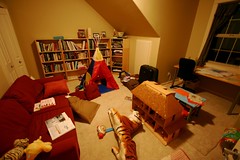Merlin’s weekly podcast with Dan Benjamin. We talk about creativity, independence, and making things you love.
InspiradoWorking In CloseBrian Oberkirch | Jan 11 2008"Inspiration is for amateurs. I just get to work." -- Chuck Close
< p> It may be that I like hearing about the work habits of writers and artists I like almost as much as I like their work. How do you force yourself to do work no one (really, like, no one) is clamoring for, in addition to doing the long apprentice work you need to do to build your chops? As most of our work gets less structured and more creative, it might prove helpful to take a look at how artists get their stuff done. And, sorry, all those romantic notions you have of absinthe spoons, manic episodes and Kerouac-like rambling on a long roll of butcher paper really aren't operative. Creative work is mostly showing up every day and enduring a million tiny failures as you feel your way to something a bit new. read more »15 Comments
POSTED IN:
Death and Underachievement: A Guide to Happiness in WorkRyan Norbauer | Dec 31 2007The trite wisdom of contemporary folklore instructs us that the arrival of the New Year is a time to reflect on the achievements of the preceding 365 days and to bear down and "resolve" to achieve more in those to come. Over time, we learn what a hydra-headed beast this is: no matter how many projects or actions we may whack off our ineluctable lists, it seems that yet more (often increasingly ambitious) commitments spring up in their place. With each new year come self-recriminations for our failure to meet the unlikely goals we've set for ourselves—lose weight, read through those piles of books and RSS feeds, start picking up our socks—and a stultifying brainstorm of new projects we'd like to take on. This New Year as I contemplate my resolutions, it's the underlying concepts of achievement and productivity that are on my mind—and by extension the still grander issues of purpose and meaning in work. I invite you then, patient reader, on a desultory First Night journey with me as I take our mutual favorite hobby—the idle navel-gazing contemplation of productivity—to its most absurd yet logical conclusion: to ask whether eradicating the need for achievement itself might not be the key to happiness in work. read more »POSTED IN:
WWLD? No. 4: Living Your LifeLance Arthur | Dec 6 2007
The biggest part of my life lessons from Leslie concerned those kind of things one doesn't often consider, but which exist all around you every day. I tend to get up and shower and check email and eat a bagel and get a latte and so on and so forth, day in and day out, every day like clockwork. Repetition and expectation. Leslie was very good at listening to the gamut of my life's little disarrays and annoyances and nail the bigger picture to the wall, and usually her advice was completely obvious once you heard her say it out loud. It just took her perspective to bring it into focus for me. I often wished she would write a book of her life lessons, and now I wish she had dictated them to me so I could write it, so I'll provide you with four of her broadest pieces of advice for instantly improving the quality of your life, and let you figure out the rest on your own. read more »POSTED IN:
Mathowie's decluttering projectMerlin Mann | Aug 22 2007Matt Haughey recently posted a Flickr set documenting a dramatic, decluttering re-do of a spare bedroom that transformed it from the typical suburban catch-all/playroom into a tidy space for hanging out and watching Monsters with the familia.
POSTED IN:
43F Series: "Back to GTD"Merlin Mann | Jul 24 2006Everybody falls off the Getting Things Done wagon from time to time. Maybe you got completely caught up on your work for a while, but then got lazy and slid back into slack. Maybe you had a crapflood of new projects that made you "too busy" to do GTD properly. Heck, maybe you just decided it was a big waste of time and threw in the towel altogether. But, for whatever reasons of frustration, neglect, or (my favorite) "being too busy," it's not at all unusual to find you've slipped on your reviews, quit capturing, and basically let your little system fall into seemingly hopeless disrepair. And, I'll bet you're paying for it now, right? You're wandering around, unsure what to do next, and you've lost confidence in your external system as a trusted outboard brain for your life. Stuff piles up. You hide the piles under newer piles. You make assurances to yourself. You start managing by crisis or by whomever in your life has the shrillest tone of voice in a given day. You've unintentionally started using the walls of your skull as a whiteboard (and you know how reliably that works). Ultimately, you're spending all your time worrying about what else you should be doing, so instead of focusing on completing a single important task at a time, you've landed back in "plate-spinning mode," half-assing your way through a dozen poorly defined projects at one time (mmmm...multitasking). Nothing's getting done. You're procrastinating. You're eating pie and crying. You want to crawl under your desk and die. Sucks, doesn't it? read more »POSTED IN:
Catching the brain rainMerlin Mann | Apr 20 2006Warm, Partly Cloudy, 100% Chance of Brain Rain I like James' ideas for catching the "brain rain" -- a way of setting aside a few minutes each day for firewalled creativity through idea generation and capture. This kind of habit could fit nicely into an end-of-day ritual, maybe before a quick review and daily cleanup. read more » POSTED IN:
GTD: Boing Boing Mark gets itMerlin Mann | Feb 3 2006Mad Professor: Getting Things Done Getting Things Done has occasionally been criticized for lacking a focus on what I call Capital Letter Nouns -- as an action-based, tactical toolset for managing life's verbs, it was never intended as a top-down treatise on generating Big Life Decisions. I happen to think that's a big part of what makes it so appealing to people (esp. the techies who crave "actionable items") -- it takes you as you are and says "Okay, let's get to work." But, funny thing: the folks who stick with GTD past the experimental try-on phase often discover it gives them sharper insight into their goals and values than some of the theoretically more lofty systems that are out there. It's always satisfying to see folks make that big breakthrough, and that's what I hear Boing Boing's Mark Frauenfelder saying over at Mad Professor:
Get those verbs under control, folks, and it's a shitload easier to even see the big nouns. POSTED IN:
Happy Birthday, Benjamin FranklinMerlin Mann | Jan 17 2006Benjamin Franklin - Wikipedia, the free encyclopedia The Father of Life Hacks was born 300 years ago today in Boston, Mass. As a writer, inventor, politician, postmaster, latter-day abolitionist, smartass, horndog, and paradox, he is, in my opinion, without peer among his countrymen. Tricorns are doffed to Ben -- and to the tireless wit and ingenuity he taught a snot-nosed democracy how to flaunt. read more »POSTED IN:
Guest post: More on distractions, from Paul FordPaul Ford | Oct 24 2005Last week, I enjoyed and linked to Paul Ford’s Ftrain post, “Followup/Distraction.” It led to us exchanging a few chatty emails, so I asked Paul to favor us with a deeper write-up on his idea of narrow vs. broad distractions. More specifically, I asked: “Is there such a thing as a good distraction?” Are there "good" distractions?by Paul Ford 
Gary Benchley, Rock Star
by Paul Ford I don't want to differentiate between "good" distractions and "bad" distractions. I want to stick to the idea of "narrow" and "broad" distractions. Because sometimes a broad distraction--like, say, getting drunk and watching the movie Red Dawn--is exactly what you need. In fact, one of the best things I can do when I'm in a rut is go see some utter-crap movie that features CIA operatives and lots of gunfire. I like to goof off a whole lot. I think it's insanity to try to justify that in any way. I struggle, though, because my PC can play a DVD of Red Dawn while I check my email and work on an essay. This sort of computing power is fine for strong-willed people, but for the weak-willed like myself it's a hopeless situation. My work requires me to patiently work through things and come up with fresh ideas. And I can honestly say that since broadband Internet came to my home a year and a half ago my stock of new, fresh, fun ideas has grown very thin. It's just too much. My mind can't wander, because, with anything that interests me, I can look it up on Wikipedia to gain some context. Before I know it I've got thirty tabs open at once in Firefox. Then new email comes in. I loathe the way computers blink to demand your attention; the computer wants to tell me, for instance, that it can't load a web page. On the Mac, my Firefox icon starts jumping up and down like an anxious toddler (I know I can probably turn this off, but there are always more pop-up windows). My computer constantly wants to share totally asinine, useless information like that with me. So I've started using an Alphasmart Neo to draft text, and WordPerfect for DOS to edit and revise. My average daily word count has doubled as a result, and my stock of fresh ideas seems to be replenishing. read more »POSTED IN:
Can we learn from the proximate candy jar?Merlin Mann | Oct 20 2005Science tackles candy nibbling: clear containers close by get patronized more often than opaque containers a bit further away.
Sure, no duh, right? Put candy out and people eat it. Big whup. Well, maybe. But try processing this from a slightly different angle. read more »POSTED IN:
|
|
| EXPLORE 43Folders | THE GOOD STUFF |


 Our
Our 

